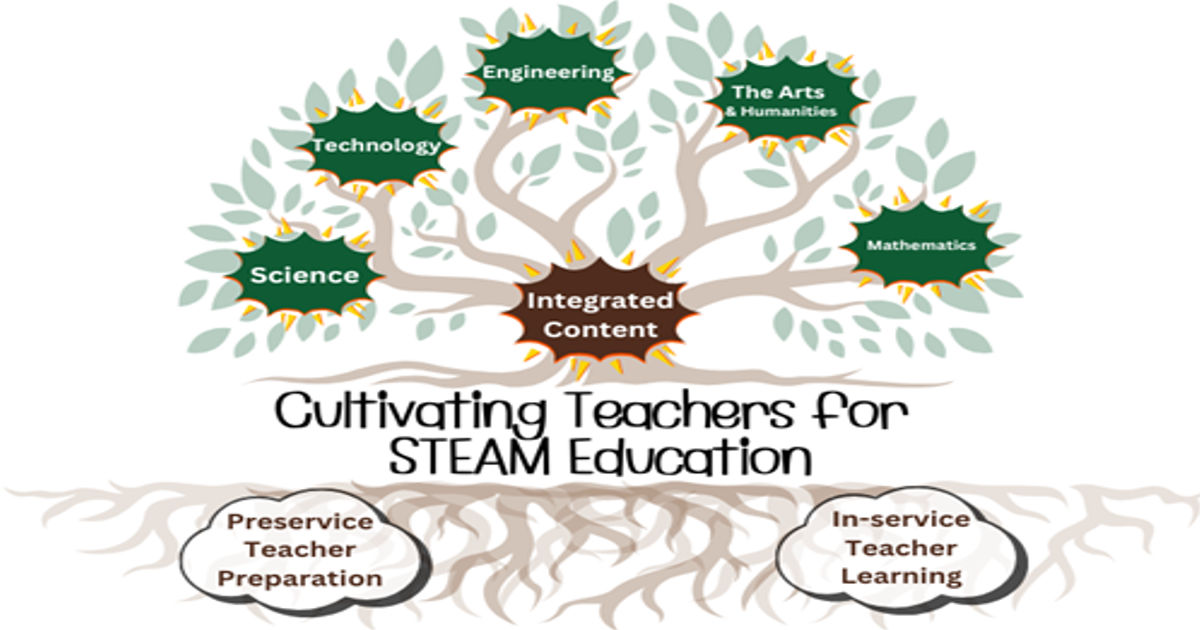Cultivating Teachers for STEAM Education
A special issue of Education Sciences (ISSN 2227-7102). This special issue belongs to the section "STEM Education".
Deadline for manuscript submissions: 31 December 2025 | Viewed by 6761

Special Issue Editors
Interests: STEM education; STEAM education; teacher preparation
Interests: teacher professional development; coaching and mentoring; teacher preparation; STEM education
Special Issue Information
Dear Colleagues,
We use the term “STEAM Education” to refer to both discipline specific (e.g., science education, mathematics education, technology education, etc.) and integrated approaches to supporting teachers who teach STEAM topics. Supporting the development of teachers for teaching STEAM is necessary and complex (Nadelson et al., 2013). STEAM education can refer to the collective siloes of science, technology, engineering, the arts, and mathematics, and also to an integrated approach to teaching. STEAM can also include computational thinking, computer science, and humanities. As approaches and programs are diverse, teachers must be supported and provided professional learning opportunities (Brand, 2020; Chai et al., 2019; Williams et al., 2019). Teacher education programs have also headed the call to prepare STEAM teachers within teacher preparation programs, certificates, foci of graduate programs including masters and doctoral work. Gaps still exist in how teachers are supported in becoming STEAM teachers, both siloed and integrated, in both teacher education (e.g., Nesmith and Cooper, 2020) and in in-service professional learning (Brand, 2020; Chai et al., 2019; Williams et al., 2019).
Thus, the purpose of this Special Issue is to highlight work in STEAM teacher education, including preservice teacher preparation and in-service teacher learning in both discipline-specific and integrated STEAM education. This Special Issue provides the opportunity to present original empirical research, conceptual pieces, evaluation of innovations in STEAM teacher learning, and research-to-practice articles. Potential paper themes include (but are not limited to) the following:
- Coaching and mentoring of STEAM teachers – sustained support/ job embedded professional learning
- The role of professional learning in dismantling oppressive practices in STEAM education
- Transformative STEAM programs as a result of professional learning programs
- Professional development projects
- Undergraduate and/ or graduate preparation of STEAM teachers
- STEAM certificate or endorsement programs
- Alternative routes to STEAM teacher preparation
- Preparation and support of special education educators in STEAM
Dr. Thomas Roberts
Dr. Stefanie Livers
Dr. Holly Plank
Guest Editors
Reference
Nadelson, L. S., Callahan, J., Pyke, P., Hay, A., Dance, M., & Pfiester, J. (2013). Teacher STEM perception and preparation: Inquiry-based STEM professional development for elementary teachers. The Journal of Educational Research, 106(2), 157-168.
Brand, B. R. (2020). Integrating science and engineering practices: outcomes from a collaborative professional development. International Journal of STEM Education, 7, 1-13.
Chai, C. S., Jong, M., Yin, H. B., Chen, M., & Zhou, W. (2019). Validating and modelling teachers’ technological pedagogical content knowledge for integrative science, technology, engineering and Mathemat-ics education. Journal of Educational Technology & Society, 22(3), 61-73.
Williams, T., Singer, J., Krikorian, J., Rakes, C., & Ross, J. (2019). Measuring pedagogy and the integration of engineering design in STEM classrooms. Journal of Science Education and Technology, 28, 179-194.
Nesmith, S. M., & Cooper, S. (2020). Elementary STEM learning. In Handbook of research on STEM education (pp. 101-114). Routledge.
Manuscript Submission Information
Manuscripts should be submitted online at www.mdpi.com by registering and logging in to this website. Once you are registered, click here to go to the submission form. Manuscripts can be submitted until the deadline. All submissions that pass pre-check are peer-reviewed. Accepted papers will be published continuously in the journal (as soon as accepted) and will be listed together on the special issue website. Research articles, review articles as well as short communications are invited. For planned papers, a title and short abstract (about 250 words) can be sent to the Editorial Office for assessment.
Submitted manuscripts should not have been published previously, nor be under consideration for publication elsewhere (except conference proceedings papers). All manuscripts are thoroughly refereed through a double-blind peer-review process. A guide for authors and other relevant information for submission of manuscripts is available on the Instructions for Authors page. Education Sciences is an international peer-reviewed open access monthly journal published by MDPI.
Please visit the Instructions for Authors page before submitting a manuscript. The Article Processing Charge (APC) for publication in this open access journal is 1800 CHF (Swiss Francs). Submitted papers should be well formatted and use good English. Authors may use MDPI's English editing service prior to publication or during author revisions.
Keywords
- STEAM teacher education
- STEAM professional development
- mathematics teacher education
- science teacher education
- engineering education
- technology education
- transdisciplinary learning
- integrated content
- computational thinking
Benefits of Publishing in a Special Issue
- Ease of navigation: Grouping papers by topic helps scholars navigate broad scope journals more efficiently.
- Greater discoverability: Special Issues support the reach and impact of scientific research. Articles in Special Issues are more discoverable and cited more frequently.
- Expansion of research network: Special Issues facilitate connections among authors, fostering scientific collaborations.
- External promotion: Articles in Special Issues are often promoted through the journal's social media, increasing their visibility.
- Reprint: MDPI Books provides the opportunity to republish successful Special Issues in book format, both online and in print.
Further information on MDPI's Special Issue policies can be found here.







